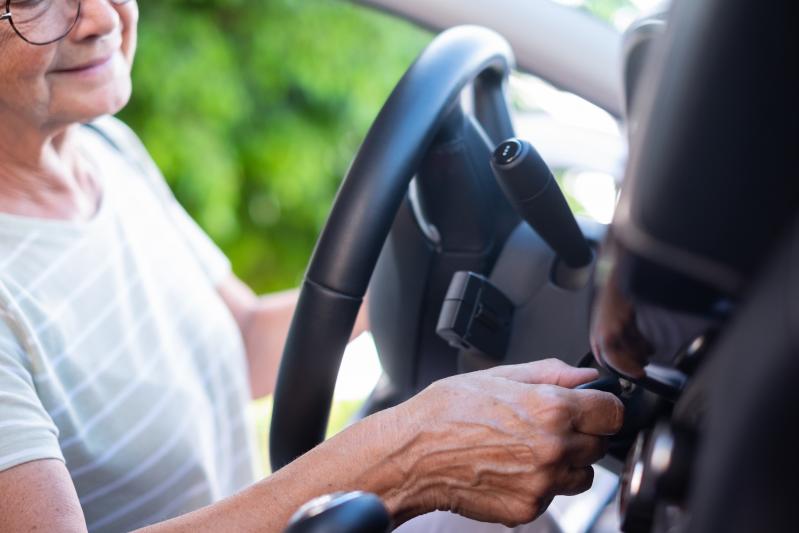Driving a car is a rite of passage in New York State when you're a teenager, a lifeline to a livelihood when you're an adult raising a family, and a means to maintain independence as you age. Handing over the keys, then, is one of the toughest transitions an elderly person will face.
"It is difficult for both the older drivers and the family," says New York State's Office for the Aging, "when the older driver has become a risk on the highways. The circumstances can result in strong emotions, conflicts, and confusion."
From declining vision and slower reaction times behind the wheel, to health care issues such as dementia or medications that induce drowsiness, there are lots of factors to consider.
"Whether or not a person has dementia, you can't just say, 'Okay it's time to take the keys away.' You have to frame it and position it in a very particular way," said Jennifer Roth, who coordinates volunteer and in-home respite services through Willing Hearts, Helpful Hands, a state-funded program spanning Nassau and Suffolk Counties that is administered by the Parker Jewish Institute for Health Care and Rehabilitation. Her team periodically presents programs on senior citizen driving safety tips, caregiver resources, and other helpful topics at the East Hampton Library and others in the region.
Evaluate Your Skills
AAA, the nationwide transportation advocacy and roadside assistance program, likens driving evaluations to getting regular physical exams from a doctor each year. "Your driving performance should be assessed regularly," the group says on its website. "Not only can this help you recognize and correct possible shortcomings, it also can result in a specialized drivers' training plan to help you continue driving safely."
AAA offers a self-test tool consisting of 15 questions that a person 65 and up should ask him/herself. A driver answers questions about recent car accidents he or she may have been in and responds to various yes-or-no prompts, such as "intersections bother me because there is so much to watch from all directions" and "I get regular eye exams to keep my vision at its sharpest." Certain scores on this self-assessment correspond to recommendations of driving with caution or handing over the keys altogether.
Many state-licensed driving schools also offer professional evaluations and brush-up lessons for older adults wishing to continue driving safely. The website for more information is bit.ly/3Uu9ftF.
Medical Considerations
For many people, health problems go hand-in-hand with aging. Did your doctor prescribe a new medication? Check the bottle for drowsiness warnings. Cars count as "heavy machinery" just as much as a forklift or tractor does.
"Make sure you have a current and accurate list of all medications and supplements you may be taking," says the Office for the Aging. "This is helpful to your doctor when you're visiting and discussing medication options. It's also good practice to run this list by your pharmacist on a regular basis, to spot any possible negative interactions or indications."
The state Department of Motor Vehicles cautions people that they are liable for damages or criminal charges if they get into a serious car accident while using a medication that impairs driving — even if they were properly using the medication under prescription from a doctor.
Dementia Endangers Drivers
This is one of the most sensitive topics: drivers suffering from memory loss and other forms of cognitive decline. It must be framed incredibly carefully and with sensitivity, Ms. Roth said.
"With cognitive decline, a person gets into the car and still knows how to drive, but they forget where they're going," she said. "We've had people who go to church on Sunday, leave church, get into the car and fall asleep in the parking lot, and wake up disoriented an hour and a half later when everyone is looking for them. They're okay, but it's not really okay."
A family member or caregiver could say it this way, Ms. Roth said: " 'Listen, we're all getting older. It's not so safe on the roads anymore. The cars and traffic are different. It's not like it used to be in the olden days, so we have to be careful.' That's how we lead in terms of approaching things with reframing the event instead of being harsh or definitive about it. Make it collaborative."
Take Advantage of Resources
East Hampton Town has a transportation program for its older residents, offering door-to-door bus service that takes people to medical appointments or the town senior nutrition facilities in East Hampton and Montauk. Trips must be booked at least 72 hours in advance, and can be arranged by calling the town's Human Services Department at 631-329-6939.
Through its Older Driver and Pedestrian Safety Project, New York State's Office for the Aging offers an award-winning handbook that addresses this topic in depth. A copy can be obtained by phoning 800-342-9871 or mailing a written request to the N.Y.S. Office for the Aging, 2 Empire State Plaza, Albany 12223-1251.
And through the Willing Hearts, Helpful Hands program, Ms. Roth can connect older adults to volunteers willing to help. There are programs in music therapy, one-on-one quality time, educational services, and support groups, creating "an environment tailored to where they're at that is helpful in staving off decline. Order, structure, exercise, healthy food, and hydration — having that structure and social stimulation helps." The phone number to call is 516-586-1507 and the email address is [email protected].

